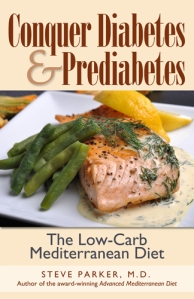 I started my Ketogenic Mediterranean Diet on September 1, 2009. After two months, I stopped compulsive record-keeping and food measurement and made a few other intentional tweaks: fish five times a week instead of seven miminum, more nuts (often two ounces a day—I like nuts and they’re convenient), less salad, more dark chocolate. Otherwise the last four months have been similar to the initial two months of strict KMD. My daily digestible carbohydrate intake has probably crept up to 40 g compared to 20-25 g on the strict KMD—this is still considered very low-carb.
I started my Ketogenic Mediterranean Diet on September 1, 2009. After two months, I stopped compulsive record-keeping and food measurement and made a few other intentional tweaks: fish five times a week instead of seven miminum, more nuts (often two ounces a day—I like nuts and they’re convenient), less salad, more dark chocolate. Otherwise the last four months have been similar to the initial two months of strict KMD. My daily digestible carbohydrate intake has probably crept up to 40 g compared to 20-25 g on the strict KMD—this is still considered very low-carb.
Accomplishments
Starting weight was 170 pounds (77.3 kg) on September 1. After two months—8.6 weeks—my weight clearly stabilized at 155 lb (70.5 kg). I lost the 15 lb (6.8 kg) over the first six weeks then just hovered around 155 lb. So average weekly weight loss over the six weeks was 2.5 pounds. Also lost a couple inches (5 cm) off my waist.
For the last four months—November through February—I’ve been eating the aforementioned liberalized KMD. Weight has stayed around 155-157 lb (71 kg). No calorie counting. I eat as much as I want, except for carbs. The experience of the first two months taught me how to eat 20-25 g of carbs in a day; it’s the gauge by which I estimate I’m eating 40 g daily now.
Has It Been Easy?
Yeah, relatively easy. Two other adults in my house are also eating low-carb, which definitely helps. Blogging here also helps me maintain compliance. I promised myself to report everything—the good, the bad, and the ugly—honestly. Accountability is important.
Staying with the program may be easier for me than for others because I am heavily invested in it, psychologically and time-wise.
It’s also been helpful for me to participate at two low-carb online communities: LowCarbFriends and Active Low-Carber Forums. We support each other. Thanks, guys.
I took diet holidays twice, for three days at both Thanksgiving and Christmas. Gained three to five pounds (1.8 kg) each time on high-carb eating, but lost it over the next week by returning to the strict KMD.
Any Surprises?
Induction flu. I’d never heard of it before. Occurs typically on days 2–5 of very low-carb dieting: achiness and fatigue. Others also experience headaches and dizziness, and it may last 1–2 weeks.
Rapid weight gain during my diet holidays (aka cheat days). I was not gorging. I figure the weight was mostly new glycogen in liver and muscle. And water.
Eating fish more than once a day is a lot of fish! Quickly boring, even unappetizing. But that’s just me. I need to be a more creative. Most of my fish lately has been canned tuna.
Assuming that the Daily Values of various nutrients recommended by the U.S. Food and Drug Administration are valid, the KMD foods come up short in many vitamins and minerals. I bet this is an issue (a problem?) with many, if not most, very low-carb diets if supplements aren’t used. Those Daily Values are debatable, of course. For instance, Gary Taubes argues that you don’t need much vitamin C if eating few carbs. My nocturnal leg cramps and constipation were proof enough for me that I needed at least some supplements. The recommended KMD supplements remedy the DailyValue shortfall in vitamins and minerals. Dr. Richard K. Bernstein has a 30-gram carbohydrate diet for his diabetic patients and himself, as outlined in his Diabetes Solution book: no supplements are required.
As time passes, I worry less about getting enough of various micronutrients. I feel fine. I’m still taking the recommended KMD supplements (5 pills a day) plus sugar-free Metamucil.
I never had hunger that I couldn’t satisfy within the guidelines of the diet.
No major trouble with cravings or longing for carbs. I’ve gone six months now without whole grain bread, oatmeal, pizza, and pasta—very unusual for me. I’d be OK never eating them again. What I do miss are sweet, often fat-laced, carbohydrates: pie, cookies, cinnamon rolls, candy bars, cake, ice cream. I doubt that desire will ever disappear, although it does for some who eat very low-carb.
I counted calories only during the first two months of this experiment. Remember, fats and proteins are unlimited. Nevertheless, I ate fewer calories than my baseline intake. This calorie reduction is a well-documented effect of very low-carb diets. Fats and proteins are more satiating than carbohydrates. It’s possible I’ve limited total calories subconsciously.
[An interesting experiment would be to try to gain weight by over-eating fats and proteins while keeping total digestible carbs under 30 g/day. Has it been done already?]
What’s Next?
I’d like to answer some intriguing questions.
Why did my weight loss stop where it did, at 155 lb (70.5 kg)?
If I’d started the KMD at 270 lb (123 kg) instead of 170 lb (77.3 kg), would my weight loss have stopped at 255 lb (116 kg), 210 lb (95.5 kg) or 155 lb (70.5 kg)?
Will two people, 300 lb each (136 kg), end up at the same final weight when following the program religiously? Probably not, but why not?
Six months ago, I believed many scientific studies supported the idea that a higher intake of carbohydrates is healthier, long-term, than the very low-carb Ketogenic Mediterranean Diet and other very low-carb diets. Studies seemed to support higher carbohydrate intake in the form of traditional fruits, vegetables, legumes, and whole grains. After reviewing the scientific literature over the last few months, I’m not so sure that higher carb consumption is necessary or beneficial for long-term health and longevity. The evidence is weak. Nearly all the pertinent studies are observational or epidemiologic—not the most rigorous science.
On the other hand, I still can’t help feeling that the recommended eating styles of people like Monica Reinagel, Darya Pino, and Holly Hickman may be healthier than the KMD over the long run, at least for people free of diabetes and prediabetes. What features unify those three? Food that is minimally processed, fresh, locally produced when able, including a variety of fruits, vegetables, nuts, whole grains, and legumes.
It seems that the human body is marvelously designed to survive, even thrive, with multiple ways of eating—but not all ways.
The strongest evidence for higher carb consumption supports whole grains as a preventative for heart disease (coronary artery disease). But the effect is modest.
The argument against higher carb consumption is simple for people with diabetes and prediabetes: carbs raise blood sugar levels, sometimes to an unhealthy degree.
I don’t see much role for highly processed, refined carbohydrates except as a cheap source of energy (calories).
What’s next for me is to formalize an opinion on which carbs, if any, and in what amount, to add back into the diet of those who have lost weight with the Ketogenic Mediterranean Diet. The answer will probably be different for two groups:
- those who have diabetes, prediabetes, or metabolic syndrome
- healthy people who just need to control weight
The goal is to maximize health and longevity without tipping over into excessive carb intake that leads to overweight and obesity with associated illnesses.
The traditional Mediterranean diet—long associated with health and longevity—is rich in carbohydrates. The Ketogenic Mediterranean Diet—much lower in carbs—has great potential to help with loss of excess weight and control of blood sugar levels. Does the KMD incorporate enough of the healthy components of the Mediterranean diet? We may never know for sure.
Steve Parker, M.D.



![MPj01779580000[1] MPj01779580000[1]](https://diabeticmediterraneandiet.files.wordpress.com/2009/10/mpj017795800001.jpg?w=150&h=100) Weight: 153 lb (69.5 kg)
Weight: 153 lb (69.5 kg) Weight: 154 lb
Weight: 154 lb
 Weight: 154 lb
Weight: 154 lb![MPPH02842J0000[1] MPPH02842J0000[1]](https://diabeticmediterraneandiet.files.wordpress.com/2009/10/mpph02842j00001.jpg?w=116&h=150) Weight: 155 lb
Weight: 155 lb Weight: 155
Weight: 155 Weight: 154 lb
Weight: 154 lb Weight: 153 lb (155 lb two days ago)
Weight: 153 lb (155 lb two days ago)
